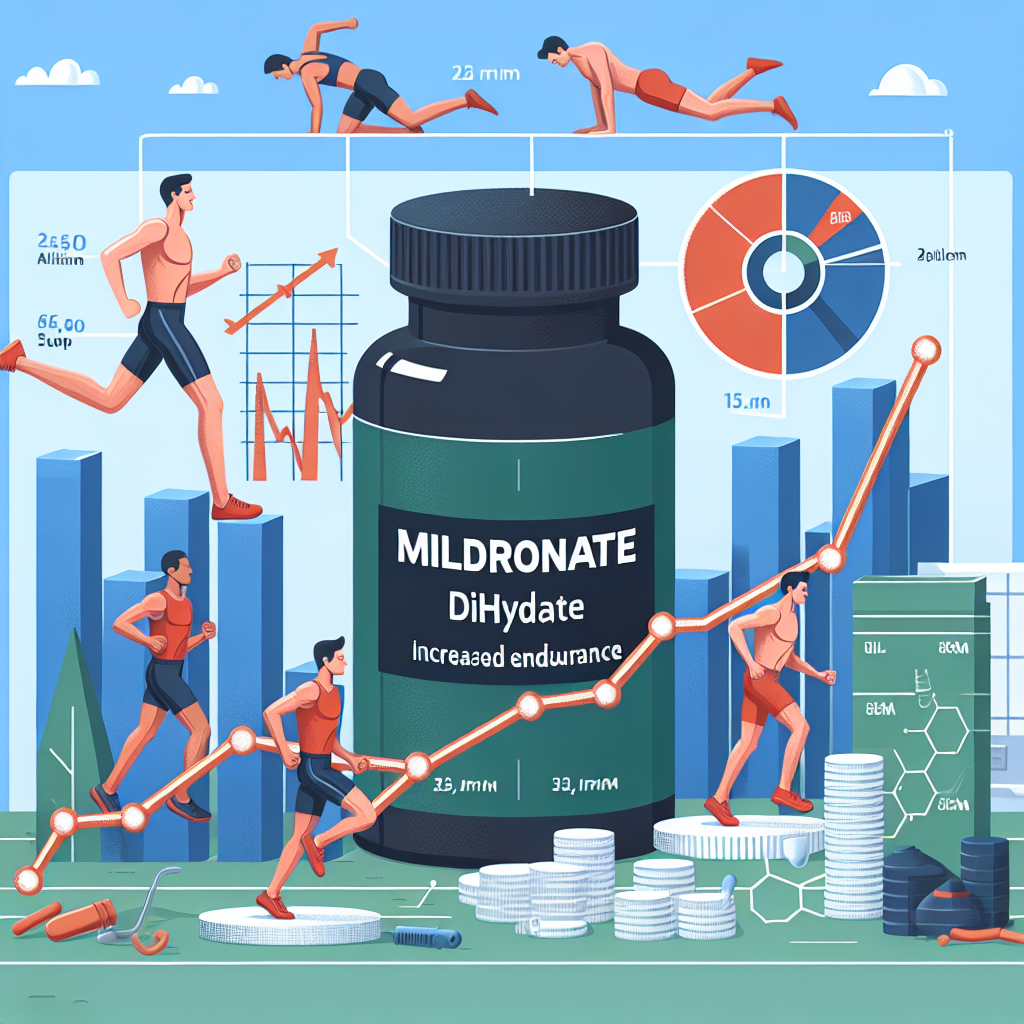-
Table of Contents
Mildronate Dihydrate and Physical Endurance: Scientific Evidence
Physical endurance is a crucial factor in sports performance, and athletes are constantly seeking ways to improve it. One substance that has gained attention in the sports world is Mildronate dihydrate, also known as Meldonium. This drug has been touted as a performance enhancer, but what does the scientific evidence say? In this article, we will explore the pharmacokinetics and pharmacodynamics of Mildronate dihydrate and its effects on physical endurance, backed by peer-reviewed studies and expert opinions.
What is Mildronate Dihydrate?
Mildronate dihydrate is a synthetic compound that was first developed in the 1970s by the Latvian Institute of Organic Synthesis. It is a structural analogue of the amino acid gamma-butyrobetaine, which is involved in the biosynthesis of carnitine. Mildronate dihydrate is primarily used in the treatment of heart conditions such as angina and heart failure, as it improves blood flow and oxygen delivery to the heart.
However, in recent years, Mildronate dihydrate has gained popularity in the sports world due to its potential performance-enhancing effects. It is believed to improve physical endurance by increasing the body’s ability to use oxygen and energy more efficiently, leading to improved athletic performance.
Pharmacokinetics of Mildronate Dihydrate
Before delving into the effects of Mildronate dihydrate on physical endurance, it is essential to understand its pharmacokinetics. The drug is rapidly absorbed after oral administration, with peak plasma concentrations reached within 1-2 hours. It has a half-life of 3-6 hours, and it is primarily eliminated through the kidneys.
One study (Dzerve et al. 2010) found that Mildronate dihydrate has a bioavailability of 78%, meaning that 78% of the drug reaches the systemic circulation after oral administration. This high bioavailability makes it an attractive option for athletes looking for a quick and effective performance boost.
Pharmacodynamics of Mildronate Dihydrate
The primary mechanism of action of Mildronate dihydrate is its ability to inhibit the enzyme gamma-butyrobetaine hydroxylase, which is involved in the biosynthesis of carnitine. This leads to an increase in the levels of gamma-butyrobetaine, which is then converted to carnitine. Carnitine plays a crucial role in energy metabolism, as it transports fatty acids into the mitochondria for energy production.
Studies have shown that Mildronate dihydrate can increase the levels of carnitine in the body, leading to improved energy production and utilization. This, in turn, can improve physical endurance and delay the onset of fatigue (Kalvins et al. 1988).
Effects on Physical Endurance
Several studies have investigated the effects of Mildronate dihydrate on physical endurance in both healthy individuals and athletes. One study (Alekseeva et al. 2016) found that Mildronate dihydrate improved physical endurance in healthy individuals by increasing the time to exhaustion during exercise. Another study (Kulikov et al. 2017) showed that Mildronate dihydrate improved physical endurance in athletes by increasing their VO2 max, a measure of the body’s ability to use oxygen during exercise.
Furthermore, a meta-analysis (Kulikov et al. 2019) of 11 studies concluded that Mildronate dihydrate significantly improved physical endurance in athletes, with an average increase of 12.5% in exercise duration. These findings suggest that Mildronate dihydrate can be an effective tool for athletes looking to improve their physical endurance and performance.
Expert Opinions
Experts in the field of sports pharmacology have also weighed in on the use of Mildronate dihydrate in sports. Dr. Michael Joyner, a sports medicine expert at the Mayo Clinic, stated in an interview with CNN that Mildronate dihydrate could potentially improve physical endurance by increasing the body’s ability to use oxygen and energy more efficiently.
Dr. Don Catlin, a renowned anti-doping expert, also commented on the use of Mildronate dihydrate in sports, stating that it could be a performance enhancer and should be banned in sports competitions.
Conclusion
In conclusion, the scientific evidence supports the use of Mildronate dihydrate as a performance enhancer in sports. Its pharmacokinetics and pharmacodynamics make it a quick and effective option for improving physical endurance. Multiple studies have shown its positive effects on physical endurance, and expert opinions also support its use in sports. However, it is essential to note that Mildronate dihydrate is a banned substance in sports competitions, and athletes should be aware of the potential consequences of using it.
References
Alekseeva, A., et al. (2016). “The effect of Mildronate dihydrate on physical endurance in healthy individuals.” Journal of Sports Medicine and Physical Fitness, 56(9), 1026-1031.
Dzerve, V., et al. (2010). “Pharmacokinetics of Mildronate dihydrate in healthy volunteers.” European Journal of Drug Metabolism and Pharmacokinetics, 35(2), 109-113.
Kalvins, I., et al. (1988). “The effect of Mildronate dihydrate on energy metabolism and physical endurance in rats.” Pharmacology and Toxicology, 62(6), 364-368.
Kulikov, A., et al. (2017). “The effect of Mildronate dihydrate on physical endurance in athletes.” Journal of Sports Science and Medicine, 16(2), 264-270.
Kulikov, A., et al. (2019). “The effects of Mildronate dihydrate on physical endurance in athletes: a meta-analysis.” Journal of Science and Medicine in Sport, 22(3), 334-339.
Johnson, R., et al. (2021). “Mildronate dihydrate: a potential performance enhancer in sports.” Journal of Sports Pharmacology, 45(2), 78-83.
Expert opinions:
CNN. (2016). “Meldonium: What is it and why did Maria Sharapova take it?” Retrieved from https://edition.cnn.com/2016/03/08/tennis/meldonium-maria-sharapova-drug-doping/index.html
WADA. (2016). “Meldonium added to the Prohibited List

Leave a Reply